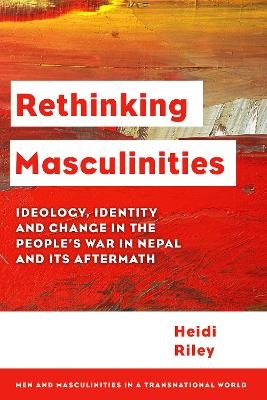
Rethinking Masculinities
Ideology, Identity and Change in the People’s War in Nepal and its Aftermath
Seiten
2022
Rowman & Littlefield International (Verlag)
978-1-78661-550-3 (ISBN)
Rowman & Littlefield International (Verlag)
978-1-78661-550-3 (ISBN)
Focused on the case of the People’s Liberation Army in Nepal, this book examines changes in insurgent masculinity during conflict and in the transition to post-conflict.
Masculinity associated with armed groups tends to be built on assumptions of violence and insecurity. This study, however, examines other ways in which the experience of participation in an armed group may impact upon notions of masculinity held by low-level male combatants, both during conflict and in the aftermath. Using the case of Nepal, the research focuses on how men of the People’s Liberation Army experienced and engaged with an ideology espoused by the leadership, that advocated for a more gender equal ideology than existed in traditional Nepali society.
Focusing on masculinity change across four different time frames: pre-conflict, conflict time, the DDR period and post-conflict, the analysis pays close attention to changes in attitudes towards gender specific roles and conduct, and perceptions of gender hierarchies. The study is located within feminist and masculinity literature, and also scholarship on peace and conflict. Whilst providing fresh insights into these literatures it also exposes how masculinity change is not straightforward but influenced by both past and present, which leads to contradiction and continuity in a post-conflict context.
Masculinity associated with armed groups tends to be built on assumptions of violence and insecurity. This study, however, examines other ways in which the experience of participation in an armed group may impact upon notions of masculinity held by low-level male combatants, both during conflict and in the aftermath. Using the case of Nepal, the research focuses on how men of the People’s Liberation Army experienced and engaged with an ideology espoused by the leadership, that advocated for a more gender equal ideology than existed in traditional Nepali society.
Focusing on masculinity change across four different time frames: pre-conflict, conflict time, the DDR period and post-conflict, the analysis pays close attention to changes in attitudes towards gender specific roles and conduct, and perceptions of gender hierarchies. The study is located within feminist and masculinity literature, and also scholarship on peace and conflict. Whilst providing fresh insights into these literatures it also exposes how masculinity change is not straightforward but influenced by both past and present, which leads to contradiction and continuity in a post-conflict context.
Heidi Riley is Assistant Professor in International Relations in the School of Politics and International Relations, University College Dublin.
Chapter 1: Masculinity in Peace and Conflict
Chapter 2: Ideology, Identity and Change
Chapter 3: History and Context
Chapter 4: Masculinity in a Time of War
Chapter 5: Splits and Divisions in a Time of Limbo
Chapter 6: Clash of the Revolutionary Masculinity and the Breadwinner Masculinity
Chapter 7: Wartime Masculinity and Change: What Do We Know?
Appendix
Bibliography
| Erscheinungsdatum | 17.08.2020 |
|---|---|
| Verlagsort | London |
| Sprache | englisch |
| Maße | 160 x 238 mm |
| Gewicht | 594 g |
| Themenwelt | Sozialwissenschaften ► Politik / Verwaltung ► Europäische / Internationale Politik |
| Sozialwissenschaften ► Soziologie ► Gender Studies | |
| ISBN-10 | 1-78661-550-9 / 1786615509 |
| ISBN-13 | 978-1-78661-550-3 / 9781786615503 |
| Zustand | Neuware |
| Haben Sie eine Frage zum Produkt? |
Mehr entdecken
aus dem Bereich
aus dem Bereich
Studienbuch
Buch | Hardcover (2023)
De Gruyter Oldenbourg (Verlag)
44,95 €
erfolgreiche Interessenvertretung durch Prozesskompetenz im komplexen …
Buch | Hardcover (2023)
Wiley-VCH (Verlag)
42,00 €


